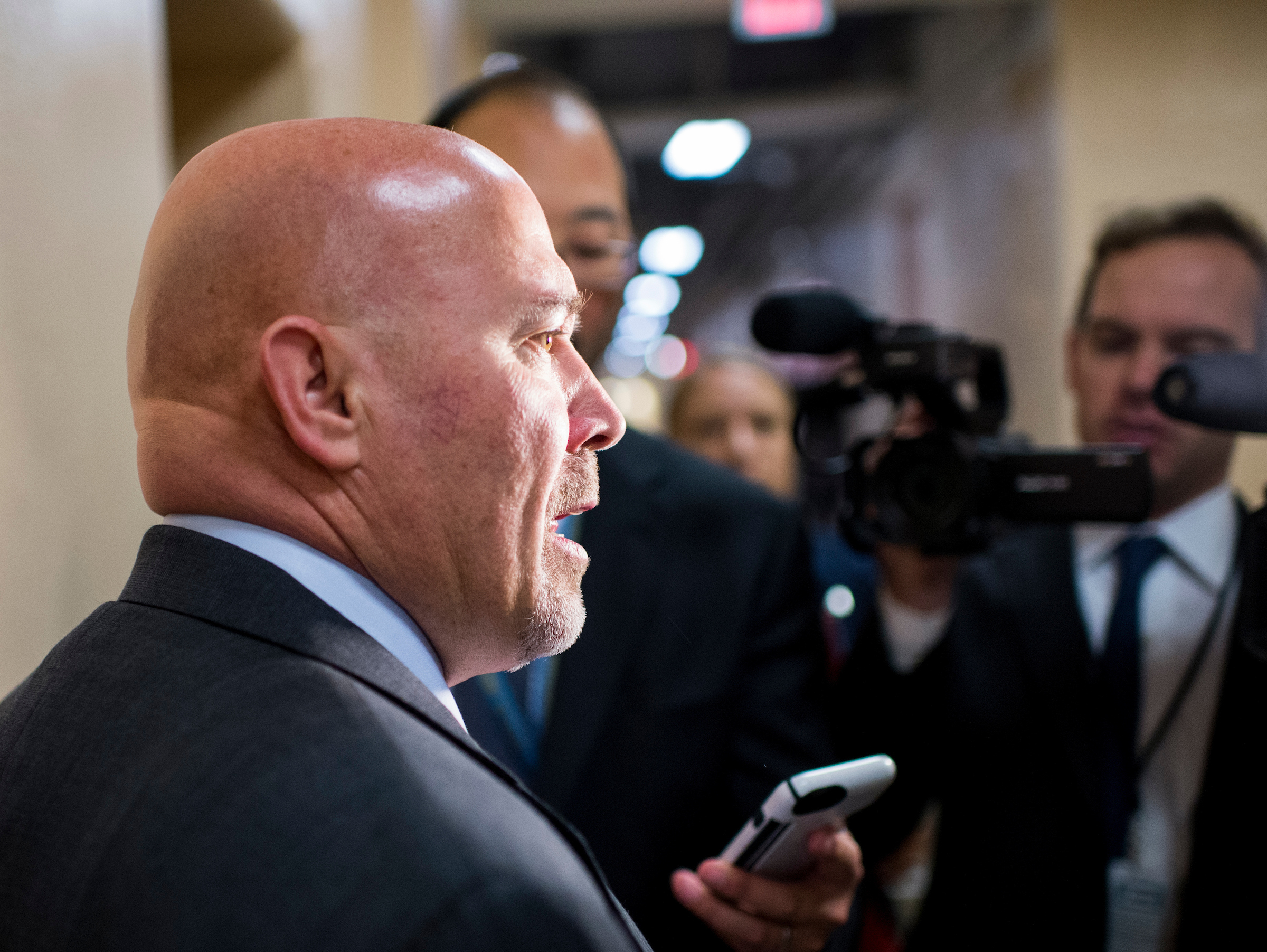Tom MacArthur Feels Heat at Home Over Health Care, Russia
Author of controversial health care amendment one of few to hold town hall

WILLINGBORO, N.J. — Republican Rep. Tom MacArthur knew it was going to be a rough night.
The architect of the amendment that’s credited with resurrecting the Republicans’ health care plan purposely planned his Wednesday night town hall in a town he lost last fall — by nearly 90 points.
Standing in the middle of a 300-person crowd, arrayed on all four sides of him, MacArthur opened with a narrative he’s used both in GOP conference meetings ahead of passage of the health care bill in the House last week and in media interviews since: that health care is personal to him because of the death of his 11-year-old daughter.
But the crowd wasn’t having it. Some of the most raucous among them complained that they’d heard that story before and suggested MacArthur was exploiting his daughter’s death for political purposes.
“Don’t tell me what I’m using,” MacArthur fired back.
“If I talk about her too much, then so be it,” he said.
Before he even began speaking Wednesday night, MacArthur was greeted with shouts of “Carpetbagger.” (The former insurance executive was the mayor of Randolph, some 90 miles to the north, before running for Congress in the 3rd District in 2014.)
The bulk of Wednesday’s questions were about health care, and the legislation that has shot the two-term lawmaker to a place of political prominence in just weeks.
But there was equally vocal anger, even if fewer questions, about possible Russian interference in the 2016 elections and whether a special prosecutor should be appointed to look into it. MacArthur doesn’t think it’s time for that yet, saying he’d rather see what “the Senate, the House and the FBI come up with first.”
That response drew a fiery back-and-forth with a constituent who asked MacArthur when he was going to “decide to be an American.”
A sampling of this @RepTomMacArthur town hall: “When are you going to decide to be an American and not a politician?” #NJ03 pic.twitter.com/zOdL4U7XtQ
— Simone Pathe (@sfpathe) May 10, 2017
Many constituents who said they have pre-existing health conditions confronted MacArthur about their fears overing losing access to insurance coverage. The congressman said they couldn’t be denied coverage.
“I’m not trying to take insurance away from anybody,” he said.
One of the most emotional moments of the night came when a widower spoke about his wife who passed away two months ago from brain cancer. The constituent said he sold insurance for a living. “The Affordable Care Act has plenty of flaws,” he said, referring to the 2010 health care law. “The problem is this law has a lot more flaws.”
MacArthur acknowledged that the legislation isn’t perfect. “Members of Congress don’t vote on the bill they wish were in front of them,” he said, inspiring jeers from the crowd.
MacArthur was one of just a handful of Republicans to vote against the budget reconciliation measure in January that allowed the GOP to proceed with its efforts to repeal and replace the 2010 law. At the time, the co-chairman of the moderate Tuesday Group said he felt the process was too rushed. But after leadership pulled their original health care bill from the floor in March before it went to a vote, MacArthur reached out to Freedom Caucus Chairman Mark Meadows about forging a deal.
The congressman said he was disappointed to see both cheering and jeering in Congress last week, specifically expressing his disappointment with Democrats singing on the House floor after the vote.
And with that, many in Wednesday’s crowd took up the refrain, “Na, na, na, na, hey, hey, hey, goodbye.”
Hours earlier, MacArthur had been sitting in a room of eighth graders at a middle school in Brick, when the superintendent, hearing about his upcoming town hall, joked that the school visit was likely to be the highlight of his day.
At times, MacArthur’s town hall resembled a rowdy classroom, with frequent interrupting. The congressman pleaded with his audience to “respect your neighbors.”
“You have to decide whether you’re going to respect yourself or if you’re just going to have your moment of noise,” he said.
After the crowd booed him for saying it’s not Congress’ role to force President Donald Trump to release his tax returns, MacArthur hurled it back at them. “I wonder how any of you would perform in Congress with that attitude,” he said.
Nearing the three-hour mark, the thinning crowd became its most boisterous, riled up by a man who spoke at length about his wife and children, all of whom have pre-existing conditions.
“You have been the single greatest threat to my family — in the entire world. You are the reason I cannot sleep,” he told the congressman.
This town hall isn’t quieting down… pic.twitter.com/dUAuOJz3wJ
— Simone Pathe (@sfpathe) May 11, 2017
“You’re done, Tommy boy,” the man said, middle finger extended toward MacArthur, alluding to the midterm elections.
MacArthur returned to the man later in the evening, saying, “It’s possible you don’t have every answer.”
A Democratic target in 2018, MacArthur easily won re-election last fall against an underwhelming opponent. MacArthur’s personal wealth (he kicked about $5 million into his 2014 race) has prevented some Democrats from challenging him in the past in what, on paper, is a competitive district. President Barack Obama carried the district in 2008 and 2012, but it swung to Trump in November.
Democrats are more optimistic about defeating the Republican this year, in part because they say MacArthur’s high-profile role in negotiating the health care bill will make it easier for a recruit to attract national money. Former Obama national security adviser Andrew Kim is currently getting the most buzz.





